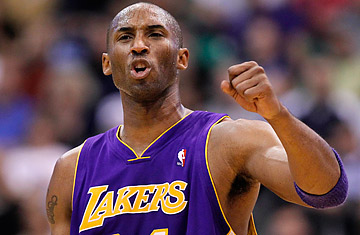
Kobe Bryant of the L.A. Lakers
After the Los Angeles city council passed legislation banning the city from doing any further business with the state of Arizona because of its new law targeting illegal immigration, some Angelenos are hoping that the L.A. Lakers will get behind the cause. In a bit of serendipitous timing, the Lakers are about to face an Arizona team, the Phoenix Suns, in the NBA Western Conference Finals, which start on Monday. Obviously, it would be absurd to expect the Lakers to boycott their series with the Suns. But as representatives of an area with the largest Hispanic population in the country, could the Lakers take some kind of stance, symbolic or otherwise, against a law the National Basketball Player's Association has called "disturbing"? Especially after the government of the city the team represents has passed a bold measure? "The Lakers are critical to continuing the momentum," says Los Angeles city council member Jose Huizar, who moved to the U.S. from Mexico when he was 4 years old.
Several members of the Suns, including star point guard Steve Nash (a Canadian), general manager Steve Kerr and owner Robert Sarver, have spoken out against the immigration measure, setting an impressive standard for modern-day political expression in sports. For their May 5 playoff game against the San Antonio Spurs, the Suns wore jerseys with the script "Los Suns." The move was both a nod to Cinco de Mayo and a gesture against the measure. Los Suns won the game, 110-102.
Your ball, L.A. The Lakers have three foreigners on their team, including star forward-center Pau Gasol, a Spaniard. The NBA has nearly 60 basketball immigrants. "Kobe Bryant and the Lakers are like America's team," says Detroit Pistons forward Charlie Villanueva, who calls the Arizona law, labeled as racial profiling by it passionate opponents, "ludicrous." Villanueva, the son of Dominican immigrants, speaks fluent Spanish. "If they were to change their jerseys or wear headbands, or do a PSA, it would hit home with a lot of households." Los Angeles city council member Ed Reyes, one of the co-authors of the Arizona-boycott legislation, is also holding high hopes for the Lakers. "It would be huge," says Reyes. "Let's be frank: most people might only give a small percentage of their day to think of a political thing. Sports are a pastime; it's something in the head. It would send a strong message."
Reyes' city council colleague Richard Alarcon is even more direct. "I love the Lakers, and hope they repeat [as NBA champions]," says Alarcon. "But there are some things more important than basketball. Democracy is more important than basketball. And the Lakers should make a statement."
Don't count on it. TIME asked the Lakers if the team had any plans to take a position on the controversial law, and the response seemed pretty clear: you'd have a better chance of seeing John McCain jumping center for the team. "We're in the business of playing basketball," says Lakers spokesman John Black, "and we're not in the business of getting into a political debate one way or another." Black refused to make any players or executives available to discuss the issue; messages to representatives of several Lakers, including Kobe Bryant, Derek Fisher (president of the National Basketball Player's Association) and Jordan Farmar, an L.A. native who attended UCLA, were not returned. After the Suns spoke out about the law in early May, Lakers coach Phil Jackson, who actively supported pal Bill Bradley's presidential campaign in 2000, said, "I don't think teams should get involved in the political stuff."
At this stage of the NBA playoffs, focusing on hoops is not unreasonable. "I won't hold it against them," says Reyes of the Lakers' reticence. "I know how hard they work in the community." Still, for immigration-rights advocates, the team's silence stings. "It's unfortunate," says Lisa Navarette, a vice president at the National Council of La Raza. "We're not asking them to go lobby the governor of Arizona. We're just saying that you can make a gesture of support for the people who root for you. The Latino community gives the Lakers a tremendous amount of support. It would be nice for them to reciprocate when the community really needs it."
Reyes would love to see "Laguneros" — Spanish for Lakers — on the team's jersey for at least one of the games against the Suns. "But that's a long word," he says, before being reminded that it contains just three more letters than Lakers. "Yeah, it would fit," he says. "They are big guys."
But are the Lakers big enough to wear them?
